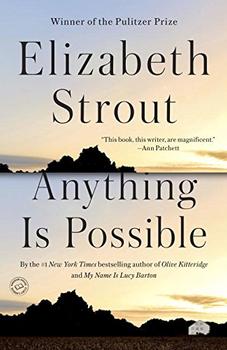Summary | Excerpt | Reading Guide | Reviews | Beyond the Book | Read-Alikes | Genres & Themes | Author Bio

Amgash Series #2
by Elizabeth StroutThis article relates to Anything Is Possible
Post-traumatic stress disorder (PTSD) is a central theme in Elizabeth Strout's novel Anything is Possible, a condition clearly experienced by Vietnam vet, Charlie Macauley, but also by other characters. Returning to Amgash, the scene of her abusive childhood, causes Lucy Barton to have a full-blown panic attack. Lucy's parents may also have suffered from PTSD – her father as a result of service in World War II, and her mother from her own abusive family background, suggested in Strout's previous novel, My Name is Lucy Barton, when Lucy's mother cannot touch her own daughter and explains that growing up she never slept but only catnapped.
PTSD was first officially recognized as a health condition in 1980, five years after the end of the Vietnam War. In 1983 Congress instructed the Veterans Association to conduct a story of post-war psychological symptoms amongst veterans. The resulting study – the National Vietnam Readjustment Study (NVVRS) found that 15% of veterans suffered from PTSD.
40 years on, more than 270,000 Vietnam veterans still show symptoms. These include:
Resulting problems include depression, suicidal tendencies, substance abuse and the consequent breakdown of family relationships or workplace difficulties. Recent studies have shown that Vietnam veterans reaching retirement age find that with more time on their hands, memories of trauma can resurface with damaging effects.
In the 1980s the diagnosis of PTSD was conceptualized as originating in experiencing a massive trauma. War, torture, rape, natural disasters were the triggers for PTSD. Since then the definition of PTSD-causing trauma has expanded to include domestic violence and child abuse. It is also now recognized that secondary exposure to trauma can cause PTSD – for example for first-responders attending to a trauma scene or for those, particularly children, living in a situation where sexual or life-threatening violence is commonplace.
Cognitive behavioral therapy and medications including anti-depressants are the mainstays of current treatments. One new approach still in its infancy is rapid intervention. Can those most directly involved in traumatic events like the September 11 terrorist attacks, the Haitian earthquake and violent wars in Iraq and Afghanistan, be treated before symptoms of PTSD develop?
Not everyone involved in trauma of this kind will suffer full-blown PTSD symptoms but research is ongoing to assess the effectiveness of offering Critical Incident Stress Debriefing (CISD), although results are disappointing so far.
Another new area is "psychological first aid" where first responders, emergency workers and school crisis response teams are trained in supporting victims of trauma to reduce initial distress and immediately begin helping individuals foster strategies for coping in the short and long term.
The U.S. Department of Veterans Affairs has a wealth of information on this and other related topics in its National Center for PTSD, dedicated to research and education about PTSD and trauma.
Filed under Medicine, Science and Tech
![]() This "beyond the book article" relates to Anything Is Possible. It originally ran in May 2017 and has been updated for the
March 2018 paperback edition.
Go to magazine.
This "beyond the book article" relates to Anything Is Possible. It originally ran in May 2017 and has been updated for the
March 2018 paperback edition.
Go to magazine.
Some books are to be tasted, others to be swallowed, and some to be chewed on and digested.
Click Here to find out who said this, as well as discovering other famous literary quotes!
Your guide toexceptional books
BookBrowse seeks out and recommends the best in contemporary fiction and nonfiction—books that not only engage and entertain but also deepen our understanding of ourselves and the world around us.